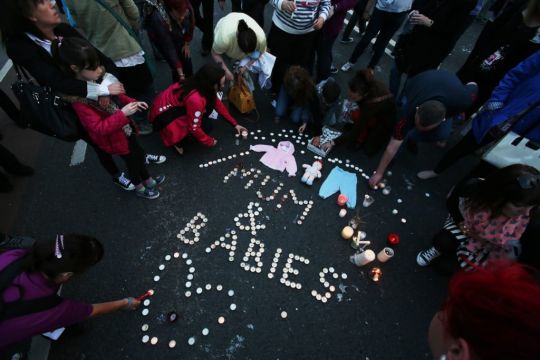The Government has published the final report of the Commission of Investigation into Mother and Baby Homes today, detailing the conditions and outcomes experienced by an estimated 56,000 women and 57,000 children.
A timeline detailing key points relating to mother and baby, and county homes has also been published as part of the final report.
Here are some of the key moment highlighted in the timeline...
1765
The Magdalen Asylum was founded, later to be known as Denny House, in Dublin.
1906
The Vice-Regal Commission on Poor Law Reform suggested the establishment of mother and baby homes to cater for unmarried mothers. The homes were to be owned or managed by religious communities, philanthropic persons, or disused workhouses, overseen by a Board of Guardians.
1908
The Children Act requires inspections of boarded out children, with local authorities required to appoint infant protection officers to inspect homes where children were nursed out.
1920
Denny House began to receive funding from the State.
1921
The Children's Home for children and unmarried women was established in Glenamaddy, Co Galway, which later relocated to Tuam in 1925.
1929
The Department of Local Government and Public Health (DLGPH) requested information from all boards of health and public assistance regarding the number of unmarried mothers in county homes. Each authority was then asked to continue supplying such information on a six-monthly basis.
1930
The Illegitimate Children (Affiliation Orders) Act provided that putative fathers could be made liable for maintenance of their illegitimate child if paternity could be established.
1931
The Legitimacy Act, which said the child of an unmarried woman was 'legitimate' if the parents married within 10 months of the child's birth.
Galway and Mayo county councils agree to admit women from the two counties to the Children's Home in Tuam.
1934
The Registration of Maternity Homes Act provided that all maternity homes must register, making them subject to inspections.
1936
Work began on connecting the Tuam home to the sewerage system.
1949
The interdepartmental committee on the reconstruction and replacement of county homes was established.
1951
The county homes interdepartmental committee submitted its report and a White Paper was published.
The Mother and Child welfare scheme to improve maternal and infant health was proposed by Minister for Health, Dr Noel Browne.
1952
The Adoption Act and the Social Welfare Act were passed, providing maternity allowances.
The Vital Statistics and Births, Deaths and Marriage Registration Act provides for a short form birth certificate for all infants.
1961
Tuam Children's Home closed.
1963
The contraceptive pill became available on prescription as a means of "regulating a women's menstrual cycle".
1964
The Guardianship of Infants Act provided that an unmarried mother is automatically the guardian of her child.
Máire Ní Ghráda's play, An Triail, which details the story of a single mother, was first produced.
1967
The Abortion Act was passed in England.
1969
The Fertility Guidance Company, later to become the Irish Family Planning Association, opened in Dublin, despite the prohibition on contraception.
1970
The Reformatory and Industrial Schools System Report, commonly known as the Kennedy Report, was published.
1973
The Unmarried Mother's Allowance was introduced.
A report from the Commission on the Status of Women recommended significant reforms relating to women’s work, legal status and welfare entitlements.
The ban on the employment of married women in the civil service was partially lifted.
1974
Senator Mary Robinson introduced the Illegitimate Children (Maintenance and Succession) Bill.
1976
Comhairle na n-Óspidéal recommended births should only take place in hospitals catering for 1,500 to 2,000 births a year, meaning there should be no more births in mother and baby homes.
1978
The European Convention on Legal Status of Children born out of Wedlock came into effect.
1979
Contraception legalised for 'family planning' purposes only.
Denny House amends its charter to begin admitting unmarried mothers without religious restrictions and in some cases, married women.
1982
The Law Reform Commission's report on illegitimacy was published.
1985
Pelletstown mother and baby home closed.
Responsibility for Denny House passed to the community care section of the Eastern Health Board from the Department of Health.
1987
The Status of Children Act aboloished the status of 'illegitimacy'.
1994
Denny House closed.
1995
The ban on divorce was lifted and a Commission on the Family was established.
1998
Report published by the Commission on the Family report.
A new webpage with information specifically for former residents of Mother and Baby Homes has been set up. Additional mental health supports provided by the HSE are also available to former residents. Details of these supports are available on www.yourmentalhealth.ie.







